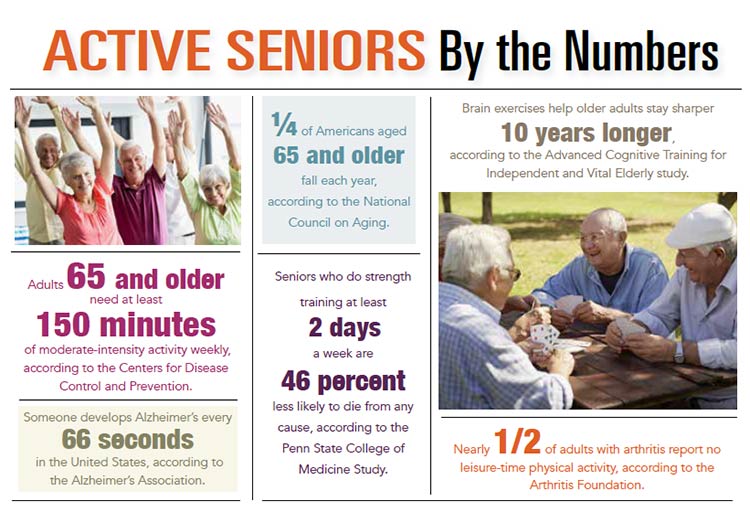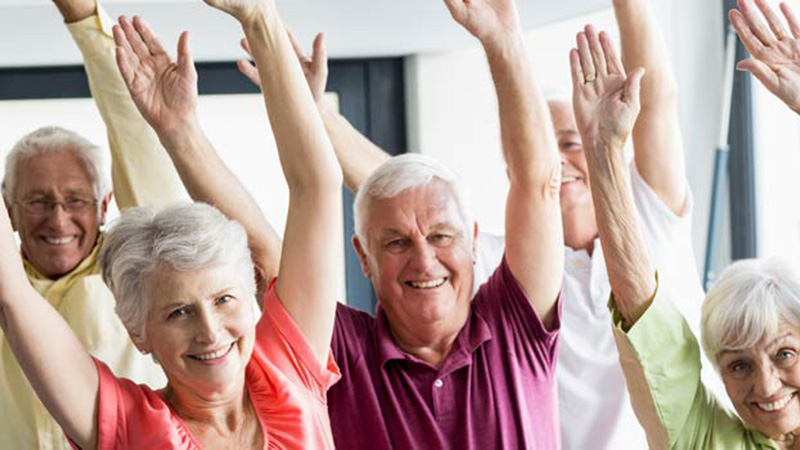An active lifestyle is one of the pillars of good health, so it should come as no surprise that as we age, exercise remains one of the most important aspects of our life. But staying active is easier said than done in the face of health problems that tend to develop and mount in our later years: arthritis, aching joints and more. Nevertheless, keeping your body and mind on their toes will keep you healthy in the long run.
Studies in the past 30 years indicate that getting physically weaker and mentally less sharp stem from lifestyle and not simply growing older. The mind, body and soul are so intricately intertwined that your active or inactive lifestyle can affect much more than your physical ability to exercise. Regular activity and daily exercise have been found to reduce the odds or delay many diseases and disabilities and can be part of an effective treatment for chronic conditions like heart disease, arthritis and high blood pressure. An inactive lifestyle, on the other hand, often leads to more doctor visits, illnesses, medications and hospitalizations.
Luckily, leading an active lifestyle doesn’t necessarily mean training for a marathon or taking up mountain climbing – unless of course you actually want to set that goal. The Centers for Disease Control and Prevention has developed guidelines of their recommended weekly ratios of exercise and muscle-strengthening activities based on the intensity level you prefer, from moderate intensity to vigorous and aerobic activities. As much as exercise in general is emphasized, studies have shown that those who also strength train – lifting weights, working with resistance bands or even yoga, for example – live longer. No matter your age, it’s never too late to get moving.
“First of all, we suggest that seniors stay active mentally and physically as much as they can, if they are healthy enough to do so,” said Hattie Fields, a nurse at Sea Island Comprehensive Health Care Corporation. “We suggest going for a walk or joining a dance class for physical exercise. For mental exercise, reading a book you enjoy or even something as simple as practicing counting forward and backward can help keep your mind in shape.”
Fields stresses that finding a social group with which to do things you enjoy together is very important as you age. The emotional benefits of being social and involved in a group or activity have a significant impact on overall health and wellness.
In terms of exercise, Fields suggested exercising through daily pains such as arthritis.
“Exercise creates a chemical in the brain that makes you feel better. Movement is always better for pain, and, while you may need medication – it would be your doctor’s recommendation whether you take an anti-inflammatory or something else – exercise certainly helps,” Fields explained. “I encourage all of my patients experiencing pain to exercise through the pain. Initially they usually don’t feel a difference, but they get to a point where they realize the exercise is helping them feel better.”
While you should consult your physician before starting or changing any medication regimen, Fields said she often recommends to those with arthritis that they take their medication about an hour before they plan to exercise and develop that into a routine. Eventually they may not need the medication for exercise because their body begins to react to the chemical response exercise produces.
“As we age, our metabolism slows, so it is very important to be cognizant of what we intake,” said Fields. “Limiting your sugar and carbohydrate intake is important throughout life but certainly as we age. Lots of vegetables are good, but it’s also a good idea to talk to your doctor about any nutritional supplements they recommend.”
Exercising through the pain and eating right are great steps toward maintaining a healthy, active lifestyle, but if you experience symptoms such as dizziness or anything that could immediately put your health at risk, it’s best to stop and contact your doctor.
“You should always keep a journal of things going on with your body. If you’re experiencing dizziness, the doctor won’t be able to help very much if you just say ‘I get dizzy sometimes.’ Write down the time and what you’re doing when the dizziness starts. It could be a warning sign for many things, like hypovolemia or dehydration,” Fields recommended.
In the face of these mounting potential health drawbacks to aging, many seniors don’t know where to begin in order to live a healthy lifestyle, and often they are afraid of taking on too much. Others who had led active lifestyles in the past sometimes find themselves taking a break and then have trouble getting back into their past routines. In fact, statistics show that most people over the age of 65 don’t maintain an active lifestyle and therefore don’t reap the health benefits of exercise.
Programs across the Lowcountry are designed specifically to offer seniors the opportunity to get involved and stay active at a variety of intensity levels and abilities. The MUSC Wellness Center offers many healthy aging programs to support the area’s exponentially growing population of those 60 and older.
“At every age and stage of life you experience, you need to redefine yourself in terms of exercise and nutrition,” said Janis Newton, director of the MUSC Wellness Center. “Many seniors are surprised to learn that being active doesn’t really take that much effort at their age – even moderate exercise is good for you, and simple things like taking a walk every day can greatly benefit your health.”
One of the biggest concerns that Newton hears from seniors is about maintaining balance and stability.
“Understandably, the fear of falling and injuring yourself or breaking a hip is a major concern for any senior. An injury of that magnitude could significantly affect the rest of your life,” said Newton.
The MUSC Wellness Center’s classes incorporate moves and activities that help seniors maintain and build coordination, stability and balance, as well as increase joint integrity to help lessen the probability of a fall.
“These classes have infinitely more benefits than meets the eye. While your ability to balance increases, aerobic and strength training exercises help your bones and joints stay healthy, the exercise helps reduce the probability of chronic disease and high blood pressure, and your brain is being exercised as well,” Newton continued.
Newton emphasized that the best way to maintain a healthy brain as you age is to stay physically active.
“You don’t have to know what to do, and many people don’t. Going to a health professional who can recommend the types of classes for your age and ability would be good to start with,” said Newton.
Ultimately, exercise is one of the most important keys in being able to take care of yourself as you age, rather than having to have someone take care of you.
“Exercise, be content and enjoy your life, no matter your age,” said Newton. “Taking care of your body is non-negotiable – it makes a difference at every age and stage; there’s no bones about it. If you currently lead a sedentary lifestyle, get out of your comfort zone and start a healthy lifestyle now. There’s still time for you to change your life.”
Whether 65 is a long way away or has come and gone for you, the answer remains the same: a healthy, active lifestyle today and every day can lead to a longer, healthier and more independent life. While you took your baby steps many years ago, you can still write a great next chapter in your life by taking the first step now in a healthy new direction.








